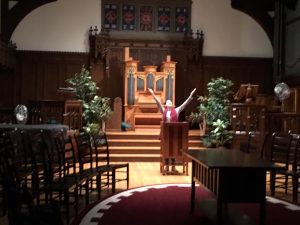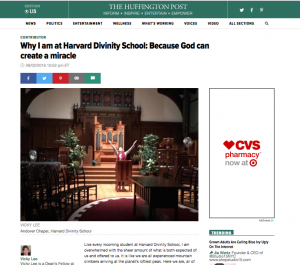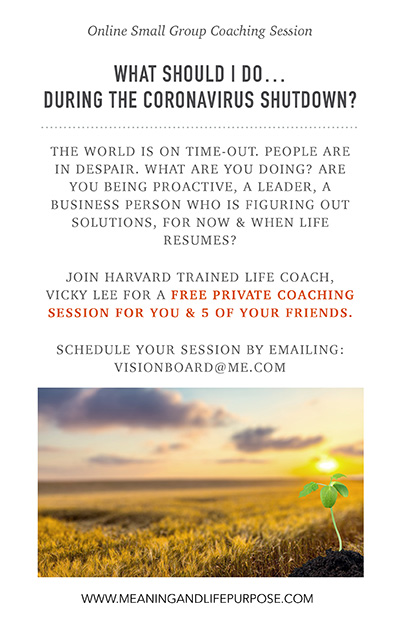Like every incoming student at Harvard Divinity School, I am overwhelmed with the sheer amount of what is both expected of us and offered to us. It is like we are all experienced mountain climbers arriving at the planet’s loftiest peak. Here we are, all of us, in unison staring at its icy cliffs, listening to the eery sound of its frozen crags shifting in the wind, while touching its base and feeling its pulse beneath our fingertips.
The impulse is always silence, as we consider the task ahead. Sometimes there is a passing comment, perhaps even conversation. But ultimately, contemplation takes over, each of us perusing our memory bank for anything in our past that would help us navigate the present.
The mountains we have climbed which gave us the confidence and the qualifications to be here are the respective religions and spiritual traditions we have lived, practiced, studied and preached. Those experiences are of no help now. They are fading into the background of what Professor Jonathon Walton refers to as “the pathology” of Harvard. “You will get depressed. You will grieve,” he says. “So do whatever it takes to stay buoyant because it will happen to you,”
When I stepped foot on campus on Day One, my killer phermones fired up. I sniffed around and smelled blood closer to the business school. I researched and hunted down the faculty whose academic focus closely resembled my background coaching CEO’s. The Divinity school seemed to be a garden compared to the closely guarded ocean of sharks next door at HBS (Harvard Business School).
With this mindset, I walk into my meeting with my advisor, Stephanie Paulsell, who teaches about the divine feminine. As soon as I sit down, I feel this spirit surrounding her, a softness, a quality that often has tried to sing to me when I’m swelling with adrenaline and ready to command a self-made executive ready to spearhead a corporate coup d’état. I know I’m here at Harvard to win.
But then, as she perceives I’m conflicted internally, she suggests I “ground myself here at HDS (Harvard Divinity School)” and perhaps “relax.” The revelation comes to me in a flash. As a fighter, my native environment is the battle field where I’ve proven myself. But God is calling me to be a preacher, not a predator.
“I am asking you, Vicky Lee,” God said to me when I was fluctuating on attending seminary, “to do this for us.”
“If I go to Harvard,” I asked him, “will I succeed in life, in my career?”
“If you go to Harvard,” he replied, “you will surrender to your destiny.”
I’m staring into my advisor’s face and I tell her, “I don’t want to cocoon myself in the fantasy of the Divinity school who envision a better world and lose touch with the reality of the business people who possess the tools to change that world.”
“I understand,” she says.
But even as she sympathizes, I feel my tongue rolling in my mouth, confessing, “I’m relying on my talent, not on God. As a survivor, my instinct is to climb. But God told me that I fall in love, I can’t climb it. God wants me to give him an opportunity to catch me. I’ve robbed him of that. Me being here at this school is not about me. It’s about us, me and God.”
Immediately after leaving her office, I go to Andover Chapel to pray. I ask God, “Hey dude, I need your help. I can’t figure out which classes to take. You gotta do this for me.”
He says to me, “It’s not the classes—it’s your life that you’re upset about.”
I pause. He’s quite intuitive. “Ok,” I comply.
“Vicky,” he whispers and then across the rows of cherry wood chairs, I see a vision appearing before me. Millions of people bowing before a God who loves them, praying and holding in their open hands, an offering—their dreams. “This happens everyday,” he says to me. “This is my reality.”
“Do you believe in a world where love rules, peace reigns and hope lives? Because if you join me in my world, money is like the grass beneath their feet,” he says referring to the people in the vision. “It is tended to with care, but it is not their rule of thumb. It is simply fun.”
I begin to weep.
“Come with me!” he says. I feel like he is dancing in the chapel. “Abandon your fear. I am here,” he sings.
The business school, like the green grass I am envisioning, seems powerless against his bare feet.
I touch my head to the floor and hear him say, “Vicky, the reason you are here at HDS is not because you can make money. It is because I can make a miracle.”


